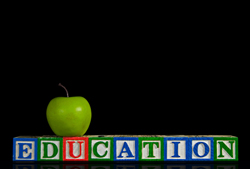The French Teaching System
In France, the education of children (and not schooling per say as many think) is compulsory from age 6 to 16. It relies on basic principles established during the 18th century up to the 20th century and can be summed up in one sentence: “The organization of a free secular compulsory public education at all levels is a state obligation”; this refers to the clause on education in the Constitution of the 4th of October 1958.
In France, two teaching systems are in place, the public sector and the private sector, the main difference being the admission fees.
- The Public Sector
It is the most common choice in France: in 2012, 78% of pupils were enrolled in public sector educational institutions. There is no admission fee but still, the quality of education is good. The teachers are hired by the government through different competitive exams taking place during their university careers. The organisation in charge of providing funds is the Cantal, the department or the city council depending on whether it is a primary school, a junior secondary school or a secondary school. Contrary to the UK, the uniform is everything but the norm!
The official website of the French public service can do a good spadework for your research and questions. Here is a link to other very useful websites from the public sector covering the teaching topic in France.
- The Private Sector
The broad majority of schools in the private sector are the “établissements privés sous contrat”: the teachings are the same as in the public sector for these private schools have signed a compliance contract with the government (the latter being in charge of the education in the country) stating that they will follow the government’s guidelines regarding education. However, the teachers are directly hired by the head of the school, the classes are smaller but so is the range of subjects on offer, especially in the vocational area. The admission fees are not as high as one would think because they are funded by the government. On the other hand, the private schools that haven’t signed a compliance contract with the government charge excessive admission fees because they choose to teach the topics they’ve selected on their own as they’re not government funded at all. Regardless of whether they have signed the contract or not, they’re all religious schools.
On this website are some useful tips about education in the private sector and here is the official private sector education phone book.
If you call the British Council at +33 1 49 55 73 00 or +33 8 92 68 44 14, it will be possible to get a list of the British and American schools in France that teach entirely in English or the secondary schools offering international curriculums or bilingual and international schools, all of this free of charge.
Getting There
If you’re looking to buy a property in France for you and your children, have a look at the Education & Training section of Qype website to find the nearest schools from the property you’re interested in.


